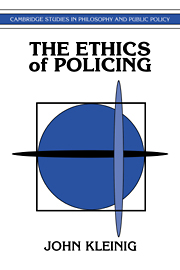Book contents
11 - Authority and accountability
Published online by Cambridge University Press: 05 June 2012
Summary
Quis custodiet ipsos custodes?
JuvenalPurely structural arrangements for achieving accountability do not, on their own, reach the problems citizens most want to reach.
Herman GoldsteinNear the beginning of this book (Chapter 2, Section 2.2), I argued that authority is a social relation in which a form of deference is accorded to those who are perceived as being “in the know” with respect to the matters for which their authority is acknowledged. Police authority is no exception. Where their authority is acknowledged, police are generally believed to know what they are about. To the extent that we see their demands as being authoritatively issued, we comply with them because we believe that they know what they are doing. Even if we are reluctant to do what they ask of us, and we comply with their orders more out of concern for the consequences if we do not than out of a recognition of the propriety of what is demanded of us, there is still an acknowledgement that, so far as the threat and/or exercise of that force is concerned, it will be informed and appropriate. Compelled compliance or compliance to avoid the consequences does not automatically carry with it the implication that there was an exercise of force majeure or that what has been imposed upon us is morally equivalent to the threat of a gunman. The police use or threat of force is authoritative because it is taken to be proportioned to the demand that has been made on us.
- Type
- Chapter
- Information
- The Ethics of Policing , pp. 209 - 233Publisher: Cambridge University PressPrint publication year: 1996

